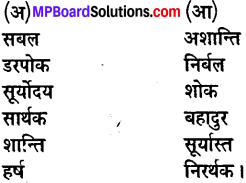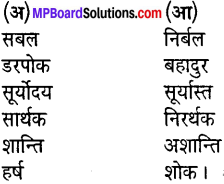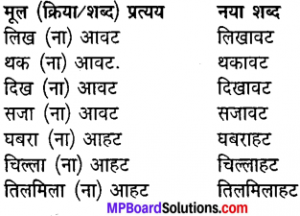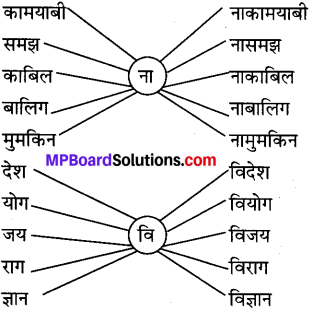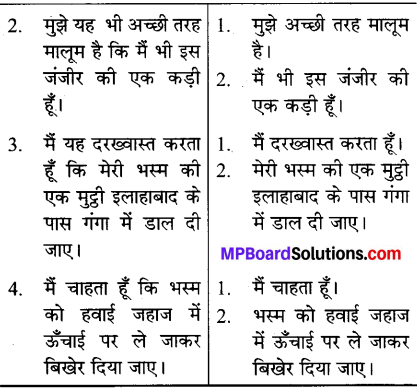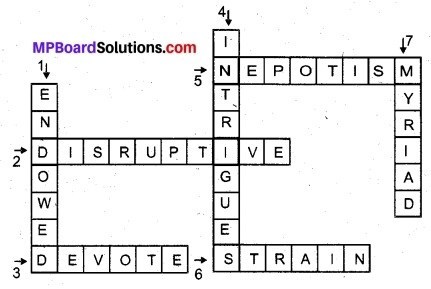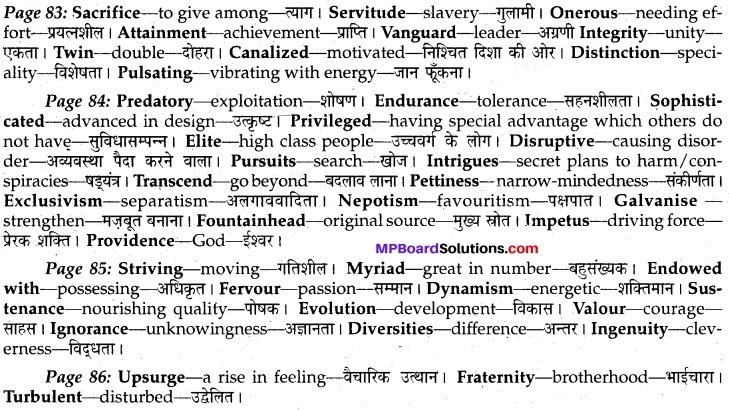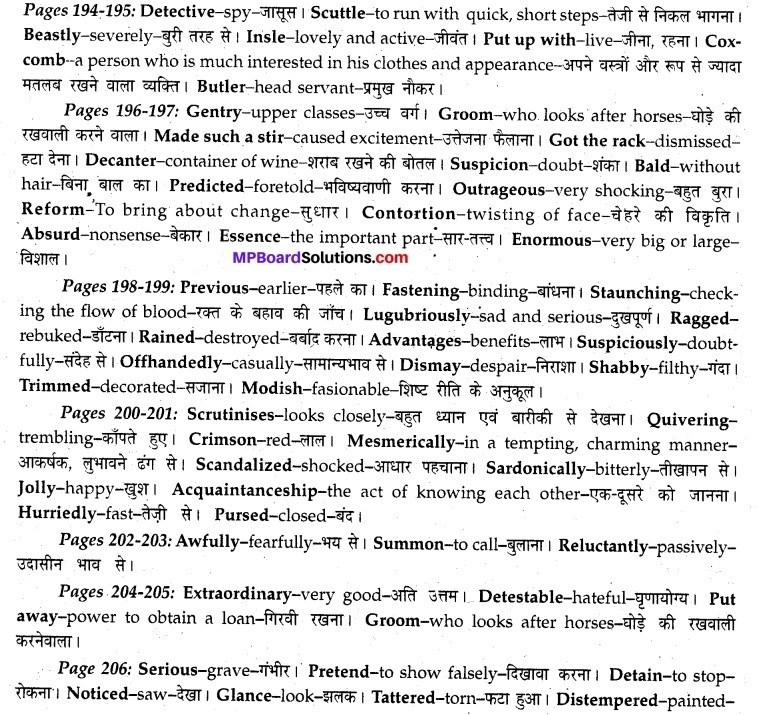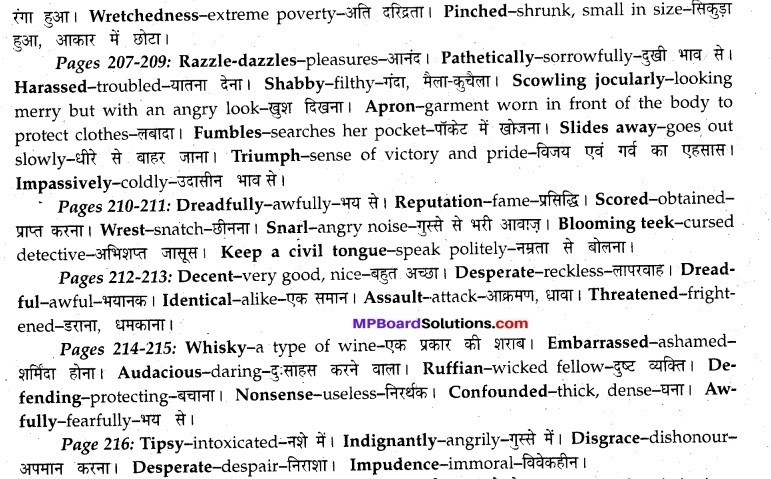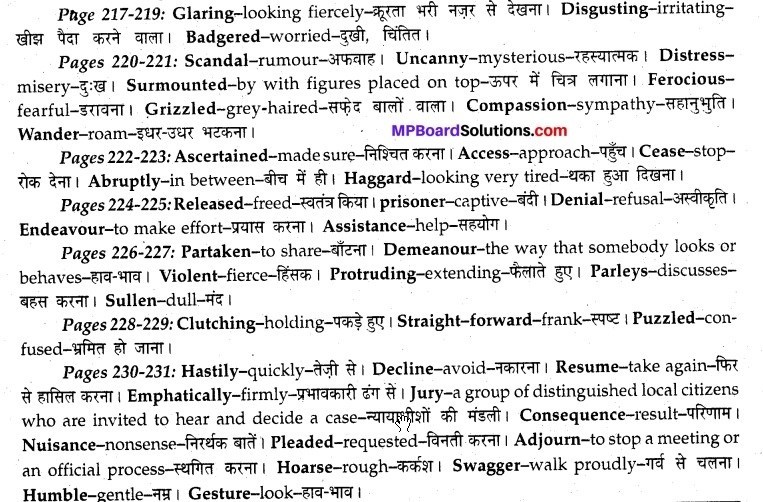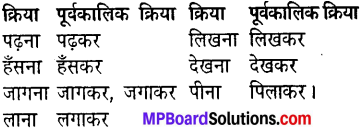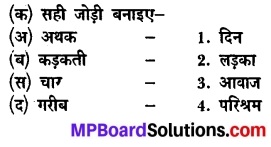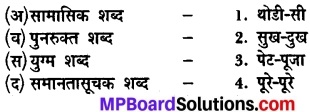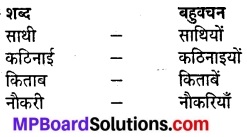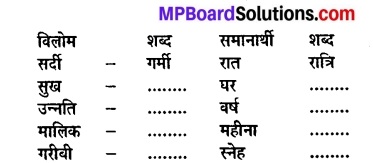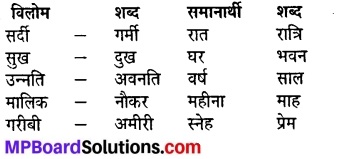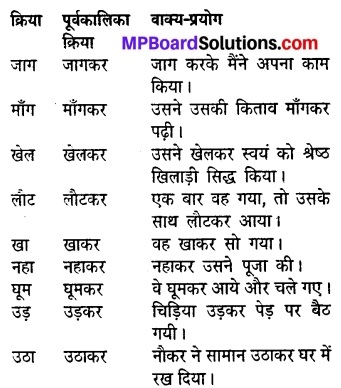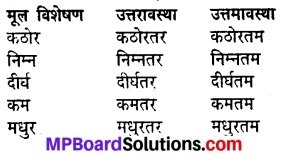In this article, we will share MP Board Class 8th Hindi Book Solutions Chapter 18 दीप से दीप जले Pdf, These solutions are solved subject experts from the latest edition books.
MP Board Class 8th Hindi Sugam Bharti Solutions Chapter 18 दीप से दीप जले
(क) सही जोड़ी बनाइए
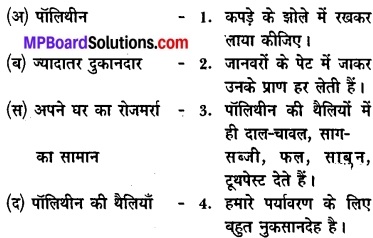
उत्तर
(अ) 4, (ब) 3, (स) 1, (द) 2
(ख) सही शब्द चुनकर रिक्त स्थान की पूर्ति कीजिए
(अ) सूरज ……………….उगल रहा था। (पानी, आग)
(ब) ……………….की थैलियाँ खाकर अब कोई गाय नहीं मरनी चाहिए। (पॉलिथीन, कागज)
(स) अब इस दीप से और ……………….दीप जलाने की जिम्मेदारी हम सभी की है। (सैकड़ों, हजारों)
(द) अनगिनत ………………उसकी आँखों में झिलमिला उठे। (तारे, दीप)
उत्तर
(अ) आग
(ब) पॉलिथीन
(स) सैकड़ों
(द) दीप
अति लघु उत्तरीय प्रश्नोत्तर
प्रश्न 1.
(अ) नितिन के बैग में क्या भरा था?
(ब) जलाने पर पॉलिथीन से कैसा धुआँ निकलता है?
(स) नितिन दोपहर में ही क्यों गया था?
(द) नितिन ने रमा को क्या सलाह दी?
उत्तर
(अ) नितिन के बैग में कपड़े का सिला हुआ एक झोला था।
(ब) जलाने पर पॉलिथीन से विषैला धुंआ निकलता था।
(स) नितिन दोपहर में गया था। यह इसलिए कि वही समय उसके पास खाली रहता था।
(द) नितिन ने रमा को यह सलाह दी कि अपने घर का रोजमर्रा का सामान कपड़े के झोले में ही लाया करें।
लघु उत्तरीय प्रश्नोत्तर
प्रश्न 1.
(अ) पॉलिथीन की थैलियाँ पर्यावरण को कैसे प्रभावित करती हैं?
उत्तर
(अ) पॉलिथीन की थैलियाँ पर्यावरण की सुरक्षा की दृष्टि से बहुत घातक हैं। ये जमीन का उपजाऊपन नष्ट करके उसे बंजर बना देती है। जलाने पर इससे निकलने वाला विषैला धुंआ हमारे वायुमण्डल को जहरीला बना देता है।
(ब)
नितिन ने जन्मदिन पर कौन-सा उपहार चाहा और क्यों?
उत्तर
नितिन ने जन्मदिन पर कपड़ों से सिले झोलों को उपहार लेना चाहा। यह इसलिए कि वह इन झोलों को अधिक-से-अधिक घरों में पहुँचायेगा।
(स)
नितिन की बात सुनकर रमा ने कौन-सा संकल्प लिया?
उत्तर
नितिन की बात सुनकर रमा ने यह संकल्प किया कि वह भी उसी की तरह दूसरों में पर्यावरण के चेतना जगाएगी।
(द)
नितिन को पर्यावरण प्रदूषण के विरुद्ध अभियान चलाने की प्रेरणा कैसे मिली?
उत्तर
नितिन को पर्यावरण प्रदूषण के विरुद्ध अभियान चलाने की प्रेरणा हो रहे प्रदूषण के खतरनाक परिणामों को देखकर समझने से मिली।
(इ)
‘दीप से दीप जले’ से लेखिका का क्या आशय है?
उत्तर
दीप से दीप जले’ से लेखिका का आशय है-पर्यावरण की शुद्धता के लिए देशवासियों को प्रेरित करना।
भाषा की बात
प्रश्न 1.
बोलिए और लिखिएविषम, पर्यावरण, वायुमण्डन, विषैला।
उत्तर
विषम, पर्यावरण, वायुमण्डल, विषैला।
प्रश्न 2.
सही वर्तनी वाले शब्दों को कोष्ठक में लिखिए

उत्तर
अनुरोध, धुआँ, दूषित, ठहरिए।
प्रश्न 3.
निम्नलिखित शब्दों के हिंदी रूप लिखिएप्लीज, पोस्टमैन, होमवर्क, आंटी, प्रिंसीपल । उत्तर
शब्द – हिंदी रूप
प्लीज – कृपया
पोस्टमैन – डाकिया
होमवर्क – आंटी
चाची प्रिंसीपल – प्रधानाध्यापक
प्रश्न 4.
निम्नलिखित शब्दों में से एक शब्द का अर्थ असमान है।
असमान शब्द पर गोला लगाइए
उत्तर
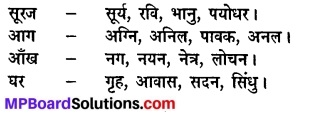
प्रश्न 5.
विलोम शब्दों को चुनकर जोड़ी बनाइए
उत्तर
विषम – सम
खरीदना – बेचना
प्रशंसा – निंदा
सुरखा – असुरक्षा
सुखद – दुखद
प्रश्न 6.
उदाहरण के अनुसार निम्नलिखत शब्दों में ‘दार’ प्रत्यय लगाकर नए शब्द बनाइए
उत्तर

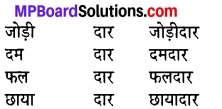
प्रश्न 7.
निम्नलिखित शब्दों के तत्सम रूप लिखिए
सूरज, धुओं, आग, गर्मी।
उत्तर
शब्द – तत्सम शब्द
सूरज – सूर्य
धुओं – धूम्र
आग – अग्नि
गर्मी – ग्रीष्म
प्रमुख गद्यांशों की संदर्भ-प्रसंग सहित व्याख्याएँ
1. सचमुच में ये पॉलिथीन की थैलियाँ हमारे पर्यावरण की सुरक्षा की दृष्टि से बहुत घातक हैं। जमीन का उपजाऊपन नष्ट करके यह उसे बंजर बना रही है। जलाने पर इनसे निकलने वाला विषेला धुआँ हमारे वायुमण्डल को जहरीला बना | रहा है। ये बैलियों पर की मोरियों और नदी-नाले में जाकर | पानी का बहाव रोकती हैं। जानबर के पेट में जाकर उनके प्राण | ले लेती हैं, फिर भी हम बाजार से सारा सामान इन्हीं थैलियों में लाना पसंद करते हैं। हम अपनी छोटी-सी सुविधा के लिए पर्यावरण को कितना दूषित कर रहे हैं।। |
शब्दार्थ
पर्यावरण-वातावरण। घातक-हानिकारक । बंजर-ऊसर, अनुपजाऊ।
संदर्भ – प्रस्तुत पंक्तियों हमारी पाठ्य-पुस्तक ‘सुगम भारती’ (हिंदी सामान्य) के भाग-8 के पाठ-18 के ‘दीप से दीप जले’ से ली गई है। इसकी लेखिका डॉ उषा यादव हैं।
प्रसंग- प्रस्तुत पंक्तियों में लेखिका ने पॉलिथीन की धैलियों से होने वाली हानियों के बारे में बतलाते हुए कहा है कि
व्याख्या
वास्तव में पॉलिथीन की थैलियों जहाँ हमारे दैनिक जीवन के प्रयोग में सुविधाजनक हैं, वहीं दूसरी ओर वे हमारी जीवन सुरक्षा की दृष्टि से बहुत ही हानिकारक हैं। ये उपजाऊ जमीन की शक्ति को समाप्त करके उसे अनुपजाऊ बना देती हैं। अगर इन्हें जलाया जाता है, इनसे जो धुंआ निकलता है, वह साधारण नहीं होता है, अपितु बहुत ही जहरीला होता है। इससे हमारा वातावररण स्वाभाविक रूप से विषैला बना देता है। पॉलिथीन थैलियों पानी के बहाव को रोक लेती हैं। इस प्रकार घर की मोरियाँ ही नहीं, अपितु नदी-नाले के पानी के बहाव को रोक लेती हैं। अगर इन्हें कोई जानवर खा लेता है तो ये उसकी आँत में रुक जाती है। फलस्वरूप उसकी मौत हो जाती है। ऐसी जानकारी होने के बावजूद भी हम खाने-पीने की चीजें बाहर से इन्हीं पॉलिथीन की थैलियों में लाने में अधिक रुचि दिखाते हैं। लेकिन हम यह भूल जाते हैं कि अपनी इस प्रकार की छोटी-सी इच्छा की पूर्ति करके पर्यावरण को किस प्रकार खराव कर रहे हैं।
विशेष
- भाषा प्रभावशाली है।
- यह अंश ज्ञानवर्द्धक है।
